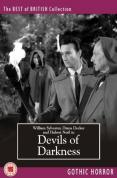![Lolita [1962]](/pictures/1013019.jpg) Lolita | DVD | (01/06/2006)
from £10.35
| Saving you £3.64 (35.17%)
| RRP
Lolita | DVD | (01/06/2006)
from £10.35
| Saving you £3.64 (35.17%)
| RRP Stanley Kubrick's 1961 version of Lolita, Vladimir Nabokov's notorious 1953 novel, prompted a scandal in its day: even to address the issue of paedophilia on screen was deemed to be as perverted as the hapless protagonist Humbert Humbert. James Mason plays Humbert, the suave English Professor whose gentlemanly exterior peels away as quickly as his scruples once exposed to Sue Lyons' well-developed teenage beauty. In order to be close to her, he marries her mother, the lonely and pathetically pretentious Charlotte (Shelley Winters) only for her to expire conveniently, leaving Humbert free to embark on a motel-to-motel trek across America with Lolita in tow, evading suspicions that theirs is more than a father-daughter relationship. Peter Sellers, meanwhile, gives a Dr Strangelove-type tour de force performance as Clare Quilty, a TV writer also in pursuit of Lolita, who harasses Humbert under several guises, including a psychiatrist. As a movie, Lolita is flawed, albeit interestingly so. The sexual innuendo (a summer camp called Camp Climax, for example) seems jarring and pointless, while Sellers' comic turn detracts from any sense of guilt, tension or tragedy. It's as if the real purpose of the film is to offer a sort of silent, mocking laughter at the wretched Humbert and systematically divest him of his dignity. By the end, he is a babbling wretch while Sue Lyons' Lolita is pragmatic and self-possessed. It's Mason and Lyons' performances, which lift the film from its mess of structural difficulties. Decades on, their central relationship still makes for pitifully compulsive viewing. On the DVD: Few extras, sadly, though the brief original trailer is excellent, built around the question, "How could they make a film out of Lolita?". The original black and white picture and mono sound are excellent. --David Stubbs
 Devils of Darkness | DVD | (23/07/2007)
from £N/A
| Saving you £N/A (N/A%)
| RRP
Devils of Darkness | DVD | (23/07/2007)
from £N/A
| Saving you £N/A (N/A%)
| RRP A secret vampire cult which has its headquarters beneath the town cemetery searches for victims for its human sacrifice rituals.
![When you come Home and The Special Bonus Short Randle & All That [DVD]](/pictures/1111710.jpg) When you come Home and The Special Bonus Short Randle & All That | DVD | (31/10/2011)
from £N/A
| Saving you £N/A (N/A%)
| RRP
When you come Home and The Special Bonus Short Randle & All That | DVD | (31/10/2011)
from £N/A
| Saving you £N/A (N/A%)
| RRP Born at 50 Wigan Road, Aspull, Greater Manchester on 30th January 1901. Frank was a childhood friend of George Formby and both of them went on to become legends of their time. Frank was just 15 when he first appeared in the theatre as an acrobatic artist (under the name Arthur Twist). It wasn't until 15 years later though that he achieved great popularity as a music hall comedian, whose wild and manic temperament brought a new style of quite risqu, if not downright vulgar comedy to the stage. For ten years Frank Randle ran his own touring company, Randle's Scandals, which played to big audiences all over the country, including headlining Blackpool's distinguished summer-season show. By 1950 he was Britain's highest paid comedian. When You Come Home is Randle's 7th Feature Film. This 1948 Butchers production directed by John Baxter, who was a very sympathetic director with social awareness - Love on the Dole and The Common Touch were good examples, and in this film he brought out another level of Randle's acting ability, other than the usual slapstick. Grandad (Randle) recounts to his grandaughter, his life as a music hall odd job man - a must for all Randle fans.Bonus Short: Randle & All That - Very rare and once thought to be lost, a short variety show of musical and comedy delight, starring Frank Randle who plays an 82 year old cobbler. Also featured are comedy song and dance artists, Arnley and Gloria and the Tumble Duo of Donavon and Byl's.

Please wait. Loading...
This site uses cookies.
More details in our privacy policy